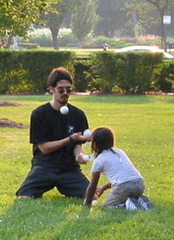A kid offered to buy me an orange today. I met him at Lumley beach as I was juggling with some other kids. He was with a group of friends of his, who were pushing him around in a wheelchair. When he came over to watch me, he crawled out of the wheelchair and slowly pulled himself across the sand - his right arm and leg inverted, twisting around themselves like a poorly formed vine. We tossed the ball back and forth, with him throwing the ball into various juggling patterns. He explained how he was living on the street around the bus station along Wallace Johnson street; he no longer had any family because most had been killed in the war or died of diseases. Beyond his fellow street kids, wheeling him around in his chair, he had no one. And then he offered to buy me an orange because he had some money.
When I was in Mali, as a UN employee, I “earned” DSA (Daily Subsistence Allowance) for resting. I earned more money by taking a vacation than these children may make in a lifetime; I earned more money for one day of “rest and recuperation” than families here make in a year. I came here to fight against injustice; sometimes I wonder if I’m part of the source of it. We talk of income inequality back in America, but we have no idea of what it looks like. The UN perpetuates one of the most glaring systems of income inequalities in the world, and I am the beneficiary. And while we maintain our positions of wealth, a poor street kid offered to buy me an orange.
In Mali, I thought a lot about one of Thomas Aquinas’s arguments, and as the children stripped off their old and ragged clothes and headed to play in the ocean, I thought of it again. Aquinas, in contrast to Nozick or Rand, argued that right to property or ownership was based less on possession than need. That a rich person may possess great wealth but that person had less right to that wealth, that food, that life-saving bread than a poor person, a poor and hungry child. He argued that in a sense, it was the wealthy that were stealing from the poor simply by not sharing the possessions they had. I have no interest now in parsing the philosophical merit of this argument, or dissecting the practical policy or economic implications of following the logical conclusion of this argument through to the end. Only sitting in the hot sun on Lumley beach, the sky filled with the harmattan haze, the children frolicking naked in the waves, a poor street child pulling his inverted and twisted body over the sand, I couldn’t help but feel there was at least a seed of truth to Aquinas’s claim.
After spending a few hours with them, I ended up doing what everyone else does, and what you‘re forced to do a hundred times in a country like Sierra Leone. I walked away, heading out into the long stretching beach before me - this slice of paradise, and turned my back to the least of these.
Saturday, January 26, 2008
Subscribe to:
Post Comments (Atom)

1 comment:
What will we become tomorrow? With luck, perhaps a little less cynical than we are today. I look forward to hearing from you in this way, though remember that my initial injunction still stands: if you do something stupid, I will fly down there myself and kick your sorry corpse's ass.
Post a Comment